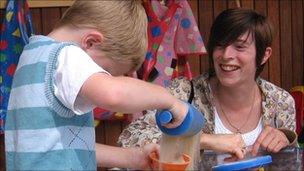Early intervention schemes create 'dramatic results'
- Published
It is hoped a government review of early intervention schemes, which it says help children to "break the cycles of underachievement", could see the project expand and save the state money in the future.
Five-year-old Elliot is a smiley, bright boy who plays happily at the Fox Hollies Children's Centre in Birmingham with his little brother Jacob. But his mother Laura Clifton, 33, said he was a different child just 18 months ago.
"After being so good at nursery, he reverted to being a very naughty child and nothing I could do seemed to rectify it," she said.
"He would purposely throw things, be violent to his brother and take it out on me. Biting was quite bad. It was upsetting because I just wasn't happy and if I'm not happy, how can my children be happy?"
This was spotted by a nursery teacher at the children's centre, who suggested Laura should try a voluntary 12-week parenting programme, Incredible Years, which is being piloted in the Midlands city.
It is what children's services providers describe as an early intervention scheme and was designed by a clinical psychologist in the US.

Laura Clifton says Elliot no longer has tantrums
It teaches parents how to communicate with their children, how to encourage them to behave better through praise and incentives and how to control problem behaviour by setting clear expectations and consistent, gentle consequences.
The course is highly prescriptive and can only be delivered by specially-trained teachers.
Laura said by the time the course had finished Elliot's behaviour had dramatically improved.
"I'm so thrilled with my son. He's more confident, he's got a wonderful imagination and he is very loving at the same time. Elliot doesn't have tantrums any more.
"He might have a whinge if he doesn't get the toy in the toy shop that grabs his attention at the moment, but you can usually just ignore it and he then gets something else in his head."
'Complete change'
Karen Blanchfield, a mother of three, also completed the Incredible Years course after struggling to control her three-year-old.
"I started resenting him, which obviously showed through my care. When you're a first time parent you don't know what you're doing - there's no handbook."
Karen believes that by the end of the course, her home was a changed place.
"It's made it a happy, calm, fun place to be," she said.
"They teach you to build on your child's confidence through praise and give them the time of day instead of just doing the housework.
"You change your routine in the house and if you give your child that time to build the relationship you will reap the rewards at the end. But you have to be consistent."
Laura's and Karen's experiences echo the findings of a trial in north Wales, which showed that Incredible Years reduced anti-social and hyperactive behaviour in children and improved their self-control. Among the parents, it reduced stress and depression.
Cheryl Hopkins, director of strategy and commissioning at Birmingham City Council said it hoped the scheme would have long-term benefits.
"It's about focusing on prevention and early intervention and investing in those services, particularly in early years, so that later on in life we won't have to provide much more intrusive and expensive services as children's lives get very difficult and complex."
Birmingham City Council is the largest local authority in the UK - and the EU - with an annual budget of £3.5bn.
It has invested £47.1m piloting nine early intervention schemes, including Incredible Years, which Ms Hopkins estimates could save more than £100m over the next 15 years, through preventing children becoming involved in the criminal justice system or falling out of education and becoming dependent on benefits.
"This is a real challenge to politicians and to managers and the city council because if you invest upfront you only see the cashable benefits down the line and often the benefits don't accrue to the city council," she said.

Advertising leaflets promise to make children more manageable and family life more enjoyable
"They may be to health authorities or the criminal justice system or the benefits system, because a lot of these children who you put on very intensive programmes will be the young people who will be employed in the future so they won't be claiming welfare benefit, they won't be homeless etcetera."
Last month the government announced an independent review of early intervention, which will report its findings at the start of 2011.
Michael Little, director of the Social Research Unit, which provides policy makers with evidence of the best children's services, said early intervention has slowly attracted more attention and money from politicians over the last seven years.
"I think with the huge economic downturn there is a sudden interest in this kind of information," he said.
"There is going to be a reduction in expenditure on children's services of around 25% in the next five years.
"That means in a place like Birmingham where they spend around £1.3bn on children (across all children's services) there's going to be £300m less being spent in five years time.
"That is a change that is unparalleled certainly in my lifetime. In that context I think it would be very difficult for any politician, any civil servant, any LA (local authority) policy-maker or manager to ignore he information that is now before us about the economic benefits of prevention and early intervention."
Hear more in a series of reports on early intervention schemes beginning Tuesday on The World Tonight, Radio 4, 2200 BST weekdays, or listen again on the BBC iPlayer.